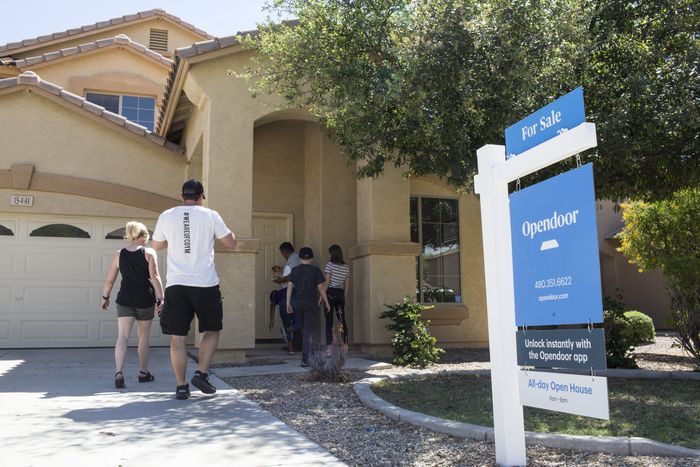
Zillow is a leading real estate information company, but the company has been losing ground to far smaller properties for years. The reason? Zillow’s archaic system of rewarding agents with cash incentives for successfully marketing their listings does not align well with modern practices.
Zillow, a real estate company that is well known for its website and mobile app, has been outplayed by its own game. Zillow’s website was hacked and the data stolen. The hackers then posted it on the dark web for sale.
Zillow seems to have over-flipped.
The corporation that has long prided itself on its ability to outsource a large amount of human labor is now referring the job back to people. Bloomberg reported on Sunday that Zillow Group’s automated house-flipping company had temporarily halted new property purchases. A Zillow spokesman noted in an email that it is “beyond operational capacity in [its] Zillow Offers business” in a comment for this story. Zillow has announced that it is now linking homeowners wishing to sell their house with its Premier Agent partners in their area.
The stop seems to be due to a lack of preparation, which is odd for a corporation that has been in the internet real estate market for over 17 years. Rather than a financial crunch, Zillow claims to have run into supply issues with on-the-ground staff and merchants. It’s only fitting that a digital firm develops an algorithm to anticipate house prices while mismanaging the human side of its business.
To add insult to injury, Zillow’s major rival seems to be doing well with huge volumes. Opendoor Technologies OPEN 3.59 percent stated it is “open for business and continues to develop and flourish,” adding that it has worked hard over the last seven years to guarantee it can deliver as it grows. While Zillow predates Opendoor as a firm, it first focused on providing an internet marketing platform for real estate brokers until introducing iBuying in 2018.
With 3,805 properties sold in the second quarter, Zillow set a new high, but that figure paled in contrast to Opendoor’s 8,494 homes sold in the same time. The firm claims it is continuing to handle house acquisitions from sellers who are already under contract as swiftly as possible, so the near-term business doesn’t seem to have fully failed. That implies, despite the dip, house sales might continue to rise sequentially in the fourth quarter. Zillow hasn’t stated anything about its fourth-quarter purchasing projection, but its third-quarter outlook suggests a “step increase” in activity.
Rather of panicking, iBuying investors should see Zillow’s revelation as an opportunity for its rivals. Opendoor currently has a presence in 44 cities, including all but two of Zillow’s 25. As a result of Zillow’s halt, Opendoor has a fantastic chance. Zillow hasn’t indicated when new house purchases will restart, but an email from a Zillow Offers Advisor to an agent obtained by the Journal says the suspension would run at least until the end of 2021.
Zillow’s mishandling also shows a significant asset for Offerpad Solutions, a smaller rival. OPAD is 0.12% of the population. That firm, led by a former real estate salesperson, has long emphasized its ground game. Offerpad, which became a publicly listed business in September after merging with a special-purpose acquisition firm, seems to have been ahead of the curve in terms of determining how many personnel to hire and where, as well as which repairs to do and how to perform them effectively. According to BTIG Research, Offerpad’s contribution profit per house sold last year was over 4.7 times that of Zillow.
Opendoor currently has a presence in 44 cities, including all but two of Zillow’s 25.
The Wall Street Journal’s Conor Ralph took this photo.
However, the news may imply that investors should begin to walk more cautiously in what has been a strong year for the industry so far. According to Mike DelPrete, a real estate digital expert and scholar-in-residence at the University of Colorado Boulder, “iBuyers have enormous quantities of market data, can plan purchases and inventories months in advance, and have a lot of levers to pull to delay or speed the company.” Given this, Zillow’s suspension was unusually abrupt and spread throughout all of its areas.
The real estate market in the United States has finally begun to cool. The typical house selling price grew 14% year over year in September, according to Redfin, the lowest growth rate since December 2020. Closed house sales and new listings of homes for sale, on the other hand, both declined by 5% and 9% from the previous year.
No other big iBuyer has announced a halt to new purchases this year. When Mr. DelPrete points out, it’s probable that as the market began to shift, Opendoor and Offerpad slowed their own purchase commitments, while Zillow ignored the indicators. More than likely, Zillow, which has constantly predicted the “Great Reshuffling” amid a permanent shift to remote labor, just failed to execute its own ground reshuffling.
Some prominent actors in the mortgage industry in the United States play critical roles in the process. Here’s what investors should know about the sector and the dangers they face when investing. Telis Demos of the Wall Street Journal explains. Martin Barraud/Getty Images/Martin Barraud
Laura Forman can be reached at [email protected].
Dow Jones & Company, Inc. All Rights Reserved. Copyright 2021 Dow Jones & Company, Inc. 87990cbe856818d5eddac44c7b1cdeb8
Related Tags
- top real estate apps
- zillow group



